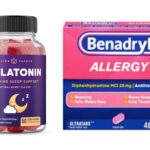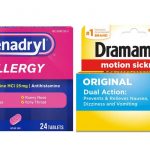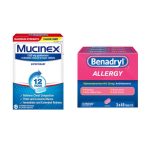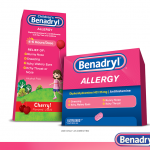What Not To Take With Benadryl
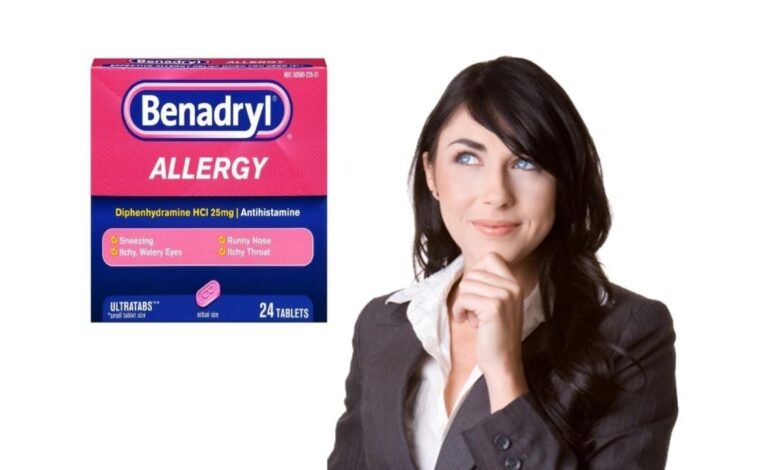
Benadryl is a brand of diphenhydramine, an antihistamine used to relieve symptoms of allergy, hay fever, and the common cold. These symptoms include rash, itching, watery eyes, itchy eyes, nose, throat, cough, runny nose, and sneezing. It is also used to prevent and treat nausea, vomiting, and dizziness caused by motion sickness.
Benadryl can also be used to help you relax and fall asleep. This medication works by blocking a certain natural substance (histamine) that your body makes during an allergic reaction. Its drying effects on such symptoms as watery eyes and runny nose are caused by blocking another natural substance made by your body (acetylcholine). Cough-and-cold products have not been shown to be safe or effective in children younger than 6 years.
What is drug interaction?
A drug interaction can be defined as an interaction between a drug and another substance that prevents the drug from performing as expected. This definition applies to interactions of drugs with other drugs (drug-drug interactions), as well as drugs with food (drug-food interactions) and other substances.
Whenever two or more drugs are being taken, there is a chance that there will be an interaction among the drugs. The interaction may increase or decrease the effectiveness of the drugs or the side effects of the drugs. The likelihood of drug interactions increases as the number of drugs being taken increases. Therefore, people who take several drugs are at the greatest risk for interactions. Drug interactions contribute to the cost of healthcare because of the costs of medical care that are required to treat problems caused by changes in effectiveness or side effects. Interactions also can lead to psychological suffering that can be avoided. This review discusses the issue of drug interactions and several ways to avoid them.
How should I take Benadryl?
Use Benadryl exactly as directed on the label, or as prescribed by your doctor. Do not use in larger or smaller amounts or for longer than recommended. Cold or allergy medicine is usually taken only for a short time until your symptoms clear up.
Do not give this medication to a child younger than 2 years old. Always ask a doctor before giving a cough or cold medicine to a child. Death can occur from the misuse of cough and cold medicines in very young children.
You should not use Benadryl to make a child sleepy.
Measure liquid medicine with the dosing syringe provided, or with a special dose-measuring spoon or medicine cup. If you do not have a dose-measuring device, ask your pharmacist for one.
For motion sickness, take Benadryl 30 minutes before you will be in a situation that causes you motion sickness (such as a long car ride, airplane or boat travel, amusement park rides, etc). Continue taking Benadryl with meals and at bedtime, for the rest of the time, you will be in a motion-sickness situation.
As a sleep aid, take Benadryl within 30 minutes before bedtime.
Call your doctor if your symptoms do not improve after 7 days of treatment, or if you have a fever with a headache, cough, or skin rash.
What Not To Take With Benadryl
There are several medications that should not be taken with Benadryl because of the increased risk of unwanted side effects resulting from interaction, according to Medical news today they include:
Anticholinergic drugs: Anticholinergic drugs block the action of acetylcholine, a chemical that relays messages between cells in your body. Benadryl also blocks acetylcholine. Because anticholinergic drugs and Benadryl work the same way, taking them together can increase the risk of side effects. Examples of these drugs include:
• fesoterodine (Toviaz)
• oxybutynin (Gelnique, Ditropan XL, Oxytrol)
• scopolamine (Transderm Scop)
• tolterodine (Detrol)
Medications that cause sleepiness: Many medications can cause sleepiness. Taking these drugs with Benadryl can increase the risk of excessive sleepiness. Examples of these medications include:
Antihistamines, such as:
• brompheniramine
• chlorpheniramine (Chlor-Trimeton)
• doxylamine (Unisom)
• dimenhydrinate (Dramamine)
• hydroxyzine (Vistaril)
Antidepressant drugs, such as:
• citalopram (Celexa)
• escitalopram (Lexapro)
• fluoxetine (Prozac, Sarafem)
• paroxetine (Paxil)
• sertraline (Zoloft)
• amitriptyline
• desipramine (Norpramin)
• doxepin
• imipramine (Tofranil)
• nortriptyline (Pamelor)
Antipsychotic drugs, such as:
• haloperidol (Haldol)
• olanzapine (Zyprexa)
• quetiapine (Seroquel)
• risperidone (Risperdal)
Benzodiazepines, such as:
• alprazolam (Xanax)
• clonazepam (Klonopin)
• diazepam (Valium)
• lorazepam (Ativan)
Opioids, such as:
• codeine
• hydrocodone (Hysingla ER, Zohydro ER)
• oxycodone (OxyContin, Roxicodone)
• tramadol (ConZip, Ultram)
Sedative-hypnotic drugs, such as:
• ramelteon (Rozerem)
• zaleplon (Sonata)
• zolpidem (Ambien)
Benadryl and Xanax: Xanax (alprazolam) is a type of drug called benzodiazepine, which can cause sleepiness. Taking Xanax with Benadryl can increase your risk of excessive sleepiness. This can make you too sleepy to drive or prevent you from doing other potentially dangerous activities safely.
If you take Xanax, talk with your doctor before taking Benadryl. They may recommend other treatment options.
Benadryl and Zoloft: Zoloft (sertraline) is an antidepressant that can cause sleepiness in some people who take it. Taking Zoloft with Benadryl may increase the risk of excessive sleepiness. This can make you too sleepy to drive or prevent you from doing other potentially dangerous activities safely.
If you take Zoloft, talk with your doctor before taking Benadryl. They may recommend other treatment options.
Benadryl and Zyrtec: Zyrtec (cetirizine) is an antihistamine. Benadryl is also an antihistamine. Taking Benadryl with Zyrtec may increase the risk of certain side effects such as sleepiness, dry mouth, fatigue, and headache.
If you take Zyrtec, talk with your doctor before taking Benadryl. They may recommend other treatment options.
Benadryl and Motrin: There are no known interactions between Benadryl and Motrin (ibuprofen).
Benadryl and acetaminophen: There are no known interactions between Benadryl and acetaminophen (Tylenol).
Benadryl and herbs and supplements: Some herbs and supplements can cause sleepiness. Taking these with Benadryl can increase the risk of excessive sleepiness. Examples of these supplements include:
• chamomile
• kava
• valerian.

